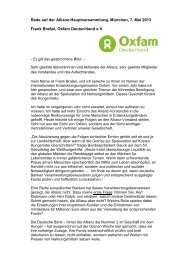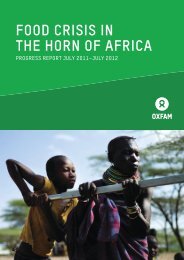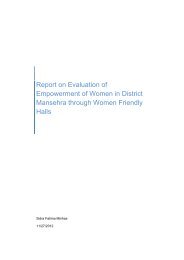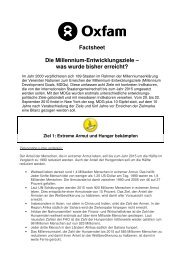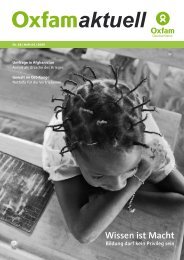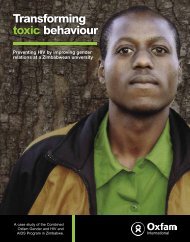No Time to Lose - Oxfam
No Time to Lose - Oxfam
No Time to Lose - Oxfam
Create successful ePaper yourself
Turn your PDF publications into a flip-book with our unique Google optimized e-Paper software.
28<br />
Ibid 30-31.<br />
29<br />
Department of the Army, US Department of Defense, Stability Operations, Field Manual 3-07,<br />
Oc<strong>to</strong>ber 2008, 6-2.<br />
30<br />
EUPOL’s objective is <strong>to</strong> ‘significantly contribute <strong>to</strong> the establishment … [of] effective civilian<br />
policing arrangements, which will ensure appropriate interaction with the wider criminal<br />
justice system’: Council Decision 2010/279/CFSP of 18 May 2010 on the European Union Police<br />
Mission in Afghanistan [2010] OJ L 123/4 , art 2.<br />
31<br />
European Union Committee, The EU's Afghan Police Mission, House of Lords Paper <strong>No</strong> 87, Session<br />
2010-11 (2011), 28.<br />
32<br />
Lt Gen William Caldwell, 'Remarks at the International Afghan National Police Symposium'<br />
(Kabul, 26 January 2011); NTM-A, above n 6, 12.<br />
33<br />
Inspec<strong>to</strong>r General, US Department of Defense, Assessment of US Government Efforts <strong>to</strong> Train, Equip,<br />
and Men<strong>to</strong>r the Expanded Afghan National Police, Report <strong>No</strong> SPO-2011-003 (2011), 1.<br />
34<br />
See Cornelius Friesendorf, 'Paramilitarization and Security Sec<strong>to</strong>r Reform: The Afghan National<br />
Police' (2011) 18(1) International Peacekeeping 79, 86; see also Caldwell, above n 32.<br />
35<br />
Interviews with and emails from senior ISAF officials, Kabul, January-March 2011. The term<br />
‘Community-based policing’ refers <strong>to</strong> ‘a philosophy … and an organisational strategy … that<br />
allows the police and community <strong>to</strong> work <strong>to</strong>gether in new ways <strong>to</strong> solve problems of crime,<br />
disorder and safety’: Hesta Groenewald and Gordon Peake, 'Police Reform through<br />
Community-Based Policing: Philosophy and Guidelines for Implementation' (International<br />
Peace Academy, 2004), 2.<br />
36<br />
Meeting with ISAF official, Kabul, February 2011.<br />
37<br />
EU Committee, above n 31, 23.<br />
38<br />
Ibid.<br />
39<br />
Government of the Islamic Republic of Afghanistan, Ministry of Interior, Afghan National Police<br />
Strategy, December 2010, 10.<br />
40<br />
NTM-A, above n 6, 18, and interviews with the Peace Training and Research Organisation, the<br />
Human Rights Research and Advocacy Consortium and AIHRC, Kabul, January-March 2011.<br />
A contrary view is presented by a survey conducted by the Afghan Civil Society Forum in<br />
March 2010, which found that ‘75% of the public reported being very happy with the police’:<br />
Afghan Civil Society Forum, 'Baseline Study for Pilot Democratic Policing Across Eight<br />
Districts of <strong>No</strong>rthern Kabul Province' (March 2010) , 7. Human rights organisations have<br />
expressed a number of concerns regarding this survey, however, including problems with the<br />
research methodology, and community fear of criticising the police.<br />
41<br />
UNAMA, Annual Report 2010, above n 15, i-ii.<br />
42<br />
On perceptions of Afghan soldiers/police: email communication from CIVIC, February 2011; on<br />
civilian casualty statistics: Afghanistan Rights Moni<strong>to</strong>r, 'ARM Annual Report: Civilian<br />
Casualties of War January-December 2010' (February 2011) 2 and UNAMA, Annual Report<br />
2010, above n 15, ii. The Afghanistan Rights Moni<strong>to</strong>r reports a <strong>to</strong>tal of 2,421 civilians killed in<br />
2010, including 278 deaths attributed <strong>to</strong> ANSF. UNAMA reports a <strong>to</strong>tal of 2,777 civilian deaths,<br />
840 of which were attributed <strong>to</strong> ‘pro-government forces’. UNAMA does not distinguish<br />
between civilian deaths attributable <strong>to</strong> international military forces and those attributable <strong>to</strong> the<br />
ANSF.<br />
43<br />
UNAMA, Annual Report 2010, above n 15, ii, 29.<br />
44<br />
Fabrizio Foschini, 'Because the Night Belongs <strong>to</strong> the Raiders' on Afghan Analysts Network (2011)<br />
.<br />
45<br />
UNAMA, ‘Afghanistan: Mid Year Report 2010, Protection of Civilians in Armed Conflict’<br />
(UNAMA Human Rights Unit, 2010) 18.<br />
46<br />
Ibid 18-19; Jerome Starkey, ‘Na<strong>to</strong> “Covered up” Botched Night Raid in Afghanistan that Killed<br />
Five’, The <strong>Time</strong>s (online), 13 March 2010,<br />
.<br />
47<br />
Gareth Porter, ‘Doubling of SOF Night Raids Backfired in Kandahar’ IPS (online), 15 September 2010,<br />
.<br />
48<br />
See ISAF Public Affairs Office, 'ISAF Issues Guidance on Night Raids in Afghanistan' (News<br />
Release, 100304-NR-012, 5 March 2010). See also International Security Assistance Force,<br />
'Tactical Directive' (2009), which requires that any entry in<strong>to</strong> an Afghan house take account of<br />
the ‘unique cultural sensitivities <strong>to</strong>wards women’.<br />
49<br />
UNAMA, Annual Report 2010, above n 15, 29.<br />
50<br />
UNAMA, Mid Year Report 2010, above n 45, 18; The Open Society Institute and The Liaison<br />
Office, 'Strangers at the Door: Night Raids by International Forces <strong>Lose</strong> Hearts and Minds of<br />
Afghans' (The Open Society Institute and The Liaison Office, 2010), 11.<br />
51<br />
Interview with AIHRC, Kabul, February 2011.<br />
52<br />
Report of the Secretary General on Children and Armed Conflict in Afghanistan, UN Doc S/2011/55 (3<br />
33




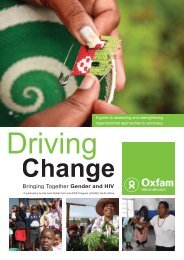

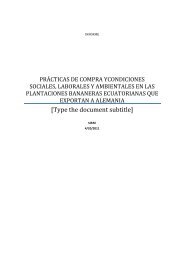
![Download: Faltposter EU-Handelspolitik [PDF 2,17MB] - Germanwatch](https://img.yumpu.com/25095854/1/190x161/download-faltposter-eu-handelspolitik-pdf-217mb-germanwatch.jpg?quality=85)
